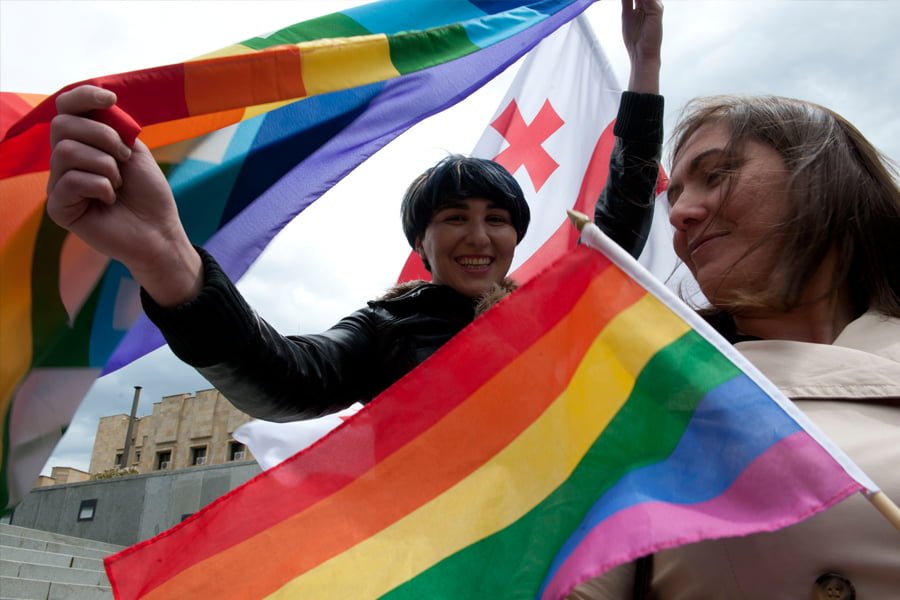A new study, published recently by the Women’s Initiatives Supporting Group (WISG), a local rights group, shows that homophobic attitudes — while remaining high — have considerably decreased in Georgia in a number of areas compared to 2016.
“Study on Public knowledge, Awareness and Attitudes Towards LGBT(Q)I Community and Legal Equality,” which includes both qualitative and quantitative research conducted in 2021, is compared to similar research data from 2016.
WISG said the social acceptance over the past five years towards lesbian people has increased more than in the case of gay men, while biphobia attitudes are more expressed, than homophobic ones.
A comparison of the results of the studies from 2016 and 2021 shows that the changes are asymmetric in nature, per the study.
The difference between groups in terms of gender, age and stratum has increased: positive changes are more pronounced in women, young people and respondents in the capital city of Tbilisi than men, the elderly and urban and rural respondents.
Sharpest Changes in Education, Freedom of Expression
According to the study, societal changes toward LGBT+ people in Georgia are sharper over freedom of expression and employment in education.
In 2016, the share of respondents who fully or mostly supported restricting employment for homosexuals in the field of education was 77.5% (the share of respondents who had a radical position was especially large — 65%).
Although direct comparison of the data with the 2021 study is problematic, the restrictions for the employment in education institutions separately for gay, lesbian, and transgender people are now shared by less than 50%.
Slightly more than a half (53%) is a share of those who did not want to employ trans people in the field. Almost every third disagrees with such restriction.
Further, although more than half of the respondents (53%) still hold the view that LGBT+ people should be legally prohibited from having the right to assemble and express themselves, it still marks a sharp decline compared to 2016 (78.1%).
The share of those respondents who consider such a restriction unacceptable has doubled (the share in 2016 was only 14.6% and in 2021 – 27.1%).
Also, over the five years, the share of respondents who assessed the work of activists negatively has decreased by almost 20 percentage points (from 74.5% to 56.8%).
However, the trend that existed in 2016 is maintained here as well, with the society being more negative towards activists than towards homosexuals in general.
55.9% of respondents in the 2021 study fully or partially share the opinion that “LGBT people should be protected, but gays/lesbians don’t have to impose their lifestyle on others.” The figure stood at 80.5% in the 2016 survey.
Stereotypes, Myths Still Strong
Society shows the least acceptance when it comes to issues of marriage and adoption by same-sex couples. The right to adopt for lesbian and gay people, as well as the right to marry, is seen not as a fight for equality, but as a struggle for “privileges.”
Despite the above-mentioned, the percentage of gay marriage opponents decreased by 14.2 percentage points (from 88.8% to 74.6%) compared to 2016, while the number of supporters increased by 5.4 percentage points.
As for the right of adoption for gay/lesbian couples, the share of its opponents decreased by about 13-14 percentage points (from 81.3% to 67.6% and 66.9%).
The share of the public that thinks that “most gay men are pedophiles” has increased compared to the 2016 study. In 2016, some 21.4% fully or partially subscribed to the statement, while the number stands at 28.8% in 2021. The share of those disagreeing (fully or partially) with the claim has decreased from 35.9% to 25.5%.
Almost half of the respondents (48.2%) agree with the statement that “LGBT people are really fighting for privileges and not for equality.” 19% completely or mostly disagree with the claim, 15.1% neither agree nor disagree, while 17.7% found it difficult to answer, or refused to answer.
In 2021, 61.2% fully and a further 12.3% partially disagreed with the claim that Georgia will have to legalize gay marriage to join the European Union. The numbers stood at 54.4% and 11.8%, respectively.
The study also found that the share of respondents that fully or partially agreed with the statement that “the number of homosexuals will increase if the society does not state clearly that heterosexual relations are the only correct forms of relations” has decreased from 78% in 2016 to 52.6% in 2021.
38.6% think that the state doesn’t respond properly to the facts of violence and discrimination against LGBT people. Only 30.7% of respondents rate the state response as adequate.
The publication was prepared by the “Women’s Initiative Supporting Group” (WISG), within the framework of the project of The United Nations Joint Programme for Gender Equality in Georgia, implemented by UN Women, UNDP and UNFPA with the support of the Government of Sweden through the Swedish International Development Cooperation Agency (Sida).
This post is also available in: ქართული (Georgian) Русский (Russian)

